- Country Areas
- Methods and indices
- Explore oral health
- About CAPP
-
- Bank of Ideas
- Nepal - Basic Oral Health Training Programme for the Health Workers of Ramechhap District
- Nepal - Manang Dental Camp Report
- Nepal - School based oral health project in remote Timal Besi
- Nepal - Training Female Community Health Volunteers in Oral Health Education
- United Kingdom - Fissure Sealant Programme for Schoolchildren in Wales
- United Kingdom - Boost Better Breaks - A School based Public Health Programme in Northern Ireland
- United Kingdom - Training programme for nursing staff on oral health care of elderly residents of nursing homes in Scotland
- United Kingdom - An Oral Cancer Awareness Campaign Programme, Scotland
- United Kingdom - Designed to Smile - Promoting Better Oral Health and Delivering Fluoride Supplementation to Children in Wales
- United Kingdom - Childsmile – the national child oral health improvement programme for Scotland
- Sweden - A school-based fluoride mouth rinsing programme
- Kenya - The Eric Dental Clinic
- Madagascar - The Vezo Hospital
- Nigeria - A School based oral health education programme for Children
- Seychelles - Dental Public Health Programmes
- South Africa - Hammanskraal Project
- South Africa - Phelophepa Healthcare Train
- Afghanistan - Dental Relief Project, Kabul
- Australia - Water fluoridation in remote Aboriginal communities
- Australia - An Aboriginal health and a Government school dental service in South Australia
- Austria - Oral Health Promotion Programme for preschool children, Vorarlberg
- Antigua and Barbuda - School based Fluoride rinse programme, 1989-1998
- Brunei Darussalam - Mission Report 1998 on training course in oral health survey method
- Cambodia - Mobile dental care for schoolchildren in Sihanoukville
- Cambodia - Outreach programme for improving oral health of under privileged children in Sihanoukville
- Cambodia - Oral Health promotion in schools in Kampong Cham
- Namibia - The "Smiling Schools" project
- South Africa - An Atraumatic Restorative Treatment (ART) Project: Activity Report
- South Africa - An Atraumatic Restorative Treatment (ART) in a Mobile Dental Clinic, Johannesburg
- Tanzania, United Republic of - The Outreach programme in primary schools around the Dar es Salaam area
- Argentina - An Oral Health Preventive Programme for School Children
- Brazil - Atraumatic Restorative Treatment for a disadvantaged Brazilian Community
- Chile - A school based oral health programme in Cabildo (2008)
- Chile - Fluoridated milk programme for rural primary school children
- Chile - Fluoridated Powdered Milk Programme
- El Salvador - Community-based programme for prevention of dental caries among children
- Honduras - Oral Health Education and Care for a resource poor Honduran community
- Honduras - Oral Health and Care in Delicias
- United States of America - Oral Health Programme for Navajo Indians in Pine Hill, New Mexico
- United States of America - Oral health Education and Sealant programme for West Philadelphian Schoolchildren
- Kuwait - A school based oral health programme during 1986-1997
- Kuwait - Community Based Schoolchildren's Oral Health Programmes 1985 -1998
- Kuwait - School Oral Health Programme (1982-2011)
- Lebanon - Final Report, a baseline survey of oral health situation and fluoride levels in drinking water (2000)
- Saudi Arabia - An ongoing oral health promotion programme
- Saudi Arabia - The Celebration of the 20th anniversary of the accession to the throne of King Fahd Ibn Abdul-Aziz
- Saudi Arabia - Oral Health Education Programme for schoolchildren in the Holy City of Mecca
- Sudan - An Oral Health Promotion through live art in Sudan
- Syrian Arab Republic - An ongoing oral health preventive programme
- United Arab Emirates - Assignment Report 1995-96 with recommendations to build a comprehensive oral health care
- United Arab Emirates - Dental Public Health Programs implemented by Dental Services Department, Dubai
- United Arab Emirates - MY SMILE” - tooth brushing program for school children in Dubai, UAE.
- Bulgaria - A community based milk fluoridation programme 1988-1993
- Bulgaria - The clinical effect of milk fluoridation for school children
- Croatia - Healthy Smile Day
- France - A School Based Oral Health Education Programme
- Germany - Third German Oral Health Study - 1997, Summary
- Germany - An Oral health programme for children attending kindergartens in two Counties in Northern Hesse
- Romania - Fluoride mouth rinsing Programme in Schools in Constanta and Iasi connties (2001-2010)
- Russian Federation - Programme focusing educating parents of infants on the prevention of caries, Moscow
- Sweden - An oral health programme for preschool children in a multicultural city area
- Sweden - The Oral Health Lift - An Oral Health Promotion Programme for the Homeless and other socially vulnerable people in Malmö
- Sweden - School based fluoride varnish application programme
- Turkey - Ongoing Atraumatic Restorative Treatment (ART) Programme in some rural areas
- Turkey - A reliable and practical dental preventive/education program model for Turkey - "brushes in the bags, teeth on the healthy-way"
- India - Training oral health workers to provide basic dental care in Ladakh
- Indonesia - Affordable toothpaste project (WHO) in West Kalimantan
- Sri Lanka - School based public health programme in Jaffna
- Sri Lanka - ART Training Programme for School Dental Therapists, Jaffna
- Sri Lanka - An oral cancer screening project in tea estates
- Sri Lanka - Oral Health Camp in rural area
- Sri Lanka - Dental public Health Programmes conducted by the Population Oral Health Unit (Community Dental Unit), Dental Institute, Colombo
- Thailand - The Royal Mobile Dental Unit project
- Thailand - School based oral health programme for children in Southern Thailand
- China - A campaign on "Love Teeth Day" celebrated nation-wide each year
- China - Milk fluoridation project (WHO) in Beijing
- China - An oral health education programme in Wuhan City
- China - An oral health education and supervised tooth brushing programme in kindergartens
- Japan - A school-based fluoride mouth rinse programme for preschool children
- Japan - Visual Support Material for Children with Autism in order to Master Toothbrushing Skills
- Viet Nam - School-based Oral Health Programme
- Viet Nam - Mission report 1999 with recommendation for oral health training
- Viet Nam - Oral health program in South Central Vietnam
- Vanatu - Mission Report on Oral Health
- Tonga - Mission Report 1997 reviewing the oral health programme
- Tokelau - Mission Report 1999 on recommendation to improve oral health
- Philippines - Mission Report 1998 on planning and implementing a national oral health survey
- Philippines - The Essential Health Care Package- “Fit for School” programme
- Mongolia - Mission Report 1999 with recommendations to improve oral health (1)
- Malaysia - reports from Oral Health Division
- Lao PDR - Caries prevalence and some caries related factors for 12-year-old children from Vientiane and Luang Prabang provinces
- Lao PDR - Estimating the fluoride concentration in the drinking waters
- Korea, Republic of - Community based caries prevention programme in a suburban area
- Sri Lanka - An ongoing school-based ART Programme
- Vanuatu - Gudfala Tut Skul Program (Healthy Tooth School Program)
- Estonia - Suukool, a mouth school
- Palestine - Integrating the WHO Health Promoting School Concept into National School Oral Health
-
Malmö University
- Country Areas
- Methods and indices
- Explore oral health
- About CAPP
-
Bank of Ideas
Bank of Ideas
- Bank of Ideas
- Vanuatu - Gudfala Tut Skul Program (Healthy Tooth School Program)
- Estonia - Suukool, a mouth school
Vanuatu - Gudfala Tut Skul Program (Healthy Tooth School Program)
Vanuatu - Gudfala Tut Skul Program (Healthy Tooth School Program)
Introduction
In 2017, a National Oral Health Survey (NOHS)1 was undertaken in Vanuatu which clearly demonstrated a need to improve oral health of Ni-Vanuatu. Consequently, a 20-week trial supervised tooth brushing project (Gudfala Tut Skul Projek) was introduced with the following objectives:
- To raise greater awareness of oral health in school children
- To determine if a supervised tooth brushing program would lead to improvement in oral hygiene habits
- To ascertain if delivery of the program could be easily managed in a school setting in Vanuatu
- To develop and test acceptance of newly developed fluoride toothpaste suitable for production in Vanuatu
- To determine if the children participating in the program might influence the oral hygiene habits of their respective family members i.e., “Gudfala Tut Famli” (Healthy Tooth Family)
Background
The NOHS Vanuatu was undertaken in 2017, adhering to WHO Basic Methodology2 using the stepwise framework covering 1721 subjects, in five age groups, at 70 sites on 24 of the 63 inhabited islands. The NOHS Report revealed high prevalence of caries and periodontal disease, as well as high prevalence of toothache and need for urgent treatment.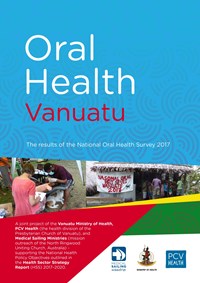
Some of the most relevant findings in the 5-7-year-old age group included:
- 70% caries prevalence , mostly untreated, and more than twice as high in urban (dmfs 10.92) than isolated rural areas (dmfs 4.34).
- 78% prevalence of bleeding gums
- 10% reported toothache in the past 30 days; of these, 50% had 2 or more episodes over the 30 day period, 86% cried due to toothache, 71% had disrupted sleep and 67% missed at least one or more days at school
- Detrimental impact of toothache on families and quality of life
- 18.7% required urgent intervention based on current pain and/or infection of dental origin
- 40% reported “rarely” or “never brushed” their teeth
A summary for each age group may be found in the NOHS 2017 Fact Sheet3.
The NOHS Report recommended five key areas of focus as a basis for improving oral health for all Ni-Vanuatu.
Key Focus #1 called for establishment of national leadership for oral health in Vanuatu. This led to the formation of the Integrated Oral Health, Eye-Care and ENT Unit in 2019 under the leadership of Public Health Dentist, Dr Jenny Stevens, within the Ministry of Health, Directorate of Public Health, and also the first Vanuatu National Oral Health Policy 2019-20234.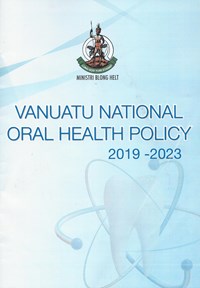
Key Focus #2 identified several areas related to oral health promotion and prevention. Having already been trialled and endorsed by the Medical Executive, Ministry of Health (MOH), Gudfala Tut Skul Program was the natural first step towards implementing one of the major recommendations under Key Focus #2.
Project outline
The Gudfala Tut Skul Program (GTSP) is a supervised toothbrushing program modelled after the NHS Scotland Childsmile Programme targeting children attending Kindergarten/Early Child Care Education Centres (ECCE) and Grade 15.
Kindergarten/ECCE generally have two classes - one for 4-year-old, and one for 5-year-old, however sometimes these are combined. Each class may have up to 20 children. Depending on the size and location of the school, Grade 1 classes may comprise up to 40 children and may have more than one class in each school.
The Program is implemented in two stages:
- Initial implementation with delivery of the GTSP Starter Pack. This stage introduces toothbrushing to the children
Each Class is provided with a toothbrush storage container which holds up to 28 or 40 brushes depending on class size; two 500ml squeezable, low density polyethylene bottles (with cap) of bubble-gum flavoured, fluoridated toothpaste (fluoride 1350 ppm), one bottle being a spare on standby to ensure that supply is always maintained. The toothpaste is dispensed at school by the teacher.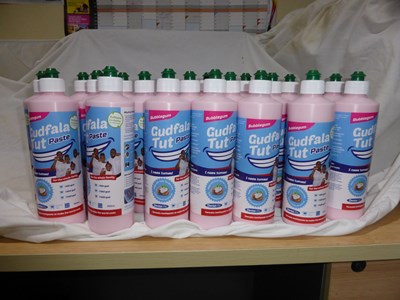
Each teacher receives written as well as illustrated toothbrushing and toothbrush storage instructions for the classroom available in either English + Bislama or English + French languages. The teacher records class brushing activity on a laminated record sheet in the classroom. Children also receive a toothbrushing record booklet to record their toothbrushing activity at home. The booklet also has information for parents and a simple explanation regarding the cause and prevention of dental caries and gum disease.
- Ongoing Supplies (toothbrushes and toothpaste) and monitoring
Each child is allocated a new toothbrush at the commencement of the program and a new brush mid-year for use at school; a new toothbrush for home at the start of the year and again replaced mid-year. Parents are requested to purchase fluoride toothpaste for use in the home.
Achievements
The Gudfala Tut Skul Projek (GTSP)6 clearly demonstrated sustained reduction in plaque indices in each of the three cohorts over the 20-week trial, using coconut oil-based fluoride toothpaste (1000ppm) in grades 1, 6 and 9 at Central School, Port Vila. Subsequently, following endorsement by the Ministry of Health (MOH) Medical Executive in 2019, GTSP was formally introduced into 6 schools and Early Child Care and Education (ECCE) Centres in Port Vila and Luganville. Full report available here.

Analysis of reticulated water samples taken from various points in both urban areas during the NOHS revealed relatively low concentrations of fluoride ion in Port Vila (0.06-0.3ppm) and Luganville (0.35-0.36ppm). Fluoride ion concentrations in samples of tank water in Port Vila were found to be even lower (0.03-0.19ppm). Fluoride in Gudfala toothpaste was therefore increased to 1350ppm i.e., within the range 1000-1500ppm recommended for communities with high caries prevalence and low fluoride ion in the main sources of drinking water1,7.
In August 2020, GTSP was implemented in two rural schools in Sulphur Bay to trial the ‘Brush in a Box’ version of GTSP intended for distribution to schools in isolated islands and implemented by teachers without the presence of a professional oral health worker. The translated versions were trialled in the two ‘Brush in a Box’ schools in Sulphur Bay and will be used in all GTSP schools in 2022.
Since 2019 the number of schools and ECCE Centres in the program has grown each year, with 38 planned for 2022:
|
Year |
Number of GTSP Schools |
Locations |
|
2018 |
1 |
Port Vila (Trial) |
|
2019 |
6 |
Port Vila/Luganville |
|
2020 |
19 |
Port Vila/Luganville/Sulphur Bay |
|
2021 |
30 |
Port Vila/Luganville/Sulphur Bay |
|
2022 |
38 |
Port Vila/Luganville/Sulphur Bay |
This well researched, strong evidence-based, and well managed program developed in partnership with local leadership. Apart from the enthusiastic support of teachers involved in the program, the positive impact of the GTSP on children and families is readily demonstrated through stories recounted by teachers at three Kindergartens during 2021.
Constraints
Constraints
Financial
In 2020, DSPPAC (Department of Strategic Policy, Planning & Aid Coordination, Ministry of the Prime Minister, Republic of Vanuatu) requested Medical Sailing Ministries Inc. (MSM) to prepare a Business Plan 2021-2025 to expand the program to cover 40 urban schools and a minimum of 80 semi-rural and rural schools by 2025. The plan has been approved but is awaiting external funding sources.
Limitations on size of oral health workforce
Efforts to address the burden of oral disease in Vanuatu having a total population of around 300,000 distributed throughout 63 inhabited islands are hampered by the relatively low dentist/population ratio estimated at 6:100,000 in 2018 compared, for example, with 58:100,000 in Australia, 20198,9. Furthermore, oral health services are mainly concentrated in two major hospital clinics in Port Vila and Luganville.
Early childhood caries (ECC) in children under 5-years old
Observations in children participating in the Gudfala Tut Skul Program over the past four years in Port Vila and Luganville, have revealed that children already have untreated caries well before entering the program at kindergarten/ECCE level.
Plans to address these issues:
1. Brush in a Box
Development of training tools and logistics plans to distribute all the implementation hardware and ongoing supplies for the Gudfala Tut Skul Program throughout the islands. Teachers in the rural areas therefore implement and run the program independently.
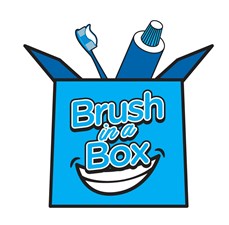
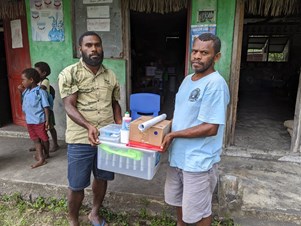
2. Training package
To help address ECC, training packages are currently under preparation for registered nurse practitioners and Bachelor of Nursing undergraduates to develop underpinning skills and knowledge to:
- identify oral disease in young children and establish appropriate referral pathways
- assess oral health risk and provide guidance for parents and carers
- apply fluoride varnish as a preventive strategy to the teeth of children from the age of 18 months up to 4 years, and to
- document the information within a recognised early childhood health care plan
The draft manual adapted with permission from the Australian Northern Territory Government Healthy Smiles Program is currently being developed together with a local team comprising three senior female dentists, two currently working at Vila Central Hospital Dental Department and one at Northern Provincial Hospital in Luganville10. These three dentists will form the basis for leading registered nurse training workshops and undergraduate training courses at the Vanuatu College of Nursing Education.
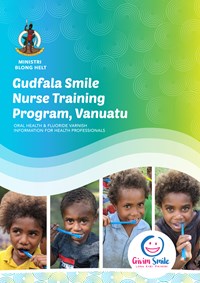
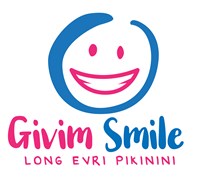
The training course manual comprises four main sections including:
- Introduction with an overview of oral health, oral health status of Ni-Vanuatu and role of child health professionals in oral health
- Background knowledge including dental anatomy, oral disease, oral health prevention and oral health promotion
- Early childhood caries
- Fluoride varnish.
The manual has been translated into the Bislama language and, where appropriate, photographs of Ni-Vanuatu extracted from a bank of images taken during the NOHS Vanuatu 2017 and GTSP over the past four years are used for illustration and cultural relevance.
The full PowerPoint lecture program will also be presented in Bislama language. Having the training course offered in Bislama will also make it more accessible to Village Health Workers thereby further expanding the potential oral workforce.
Conclusion
The Gudfala Tut Skul Program is an evidence-based model with proven success in a small developing Pacific nation targeting 4-7-year-old children attending Early Child Care Education Centres, Kindergartens and Grade 1 primary school.
It comprises toothbrushing using fluoride (1350ppm) toothpaste under supervision and promotion of healthy food choices in children at an age when healthy, life-long habits are more likely to be established during early childhood.
Recognising that early childhood caries is frequently observed in young Ni-Vanuatu children even before entering the program, the Gudfala Tut Skul Program is attempting to address the current lack of early intervention services by means of a pilot training program in preventive oral health for registered nursing professionals and nurse trainees in the Bachelor of Nursing Degree course, Vanuatu College of Nursing Education.
If successful, nurse practitioners and Village Health Workers may embrace a widespread primary care oral health workforce offering equitable early caries prevention and intervention services throughout Vanuatu.
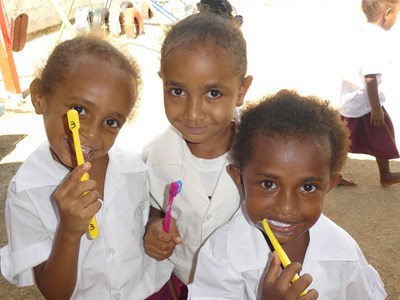
References
- National Oral Health Survey, Vanuatu 2017 Report. November 2018. NOHS 2017 Report Final.pdf (dropbox.com) Accessed February 2022
- World Health Organization, Oral Health Surveys, Basic Methods, Fifth Edition, 2013 Oral health surveys: basic methods - 5th edition (who.int) Accessed February 2022
- National Oral Health Survey Fact Sheet 2018-11-10-FACT-SHEET-FINAL.pdf (msm.org.au) Accessed February 2022
- Vanuatu National Oral Health Policy 2019 2023 Oral_Health_Policy_2019-2023-_Final.pdf (gov.vu) Accessed February 2022
- Childsmile manuals Childsmile manuals - NHS Health Scotland (child-smile.org.uk) Accessed February 2022
- Gudfala Tut Skul Projek 2018 2018-Gudfala-Tut-Oral-Health-School-Brushing-Trial-REPORT.pdf (msm.org.au) Accessed February 2022
- Do LG. Guidelines for use of fluorides in Australia: update 2019. Aust Dent J 2020: 65 (1); 30-38 Guidelines for use of fluorides in Australia: update 2019 - Do - 2020 - Australian Dental Journal - Wiley Online Library Accessed March 2022
- Ministry of Health Workforce Development Plan 2019-2025 (gov.vu) Accessed February 2022
- Oral health and dental care in Australia, Dental workforce - Australian Institute of Health and Welfare (aihw.gov.au) Accessed February 2022
- Northern Territory Government, Healthy Smiles, Oral Health & Fluoride Varnish Information for Health Professionals. 2011. https://1drv.ms/b/s!AgzeMv4UARXWhZ0yUyubNkZB-1Gong?e=uEpA6c Accessed February 2022
Acknowledgements
The NOHS Vanuatu was undertaken in 2017 by Medical Sailing Ministries Inc. (MSM) in association with Presbyterian Church of Vanuatu (PCV) Health on behalf of Ministry of Health (MOH), utilising volunteer overseas and MOH dentists/dental therapists, volunteer overseas nurses and dental surgery assistants, Ni-Vanuatu oral health workers and PCV youth volunteers trained as interpreters and survey recorders. Overseas volunteers also included yachting crews to transport survey teams to outer islands, while others had skills and experience in planning and logistics, data entry and statistical analysis.
GTSP it is entirely run by PCV Health and MOH in Vanuatu.
GTSP is supported by Medical Sailing Ministries Inc. (MSM) based in Melbourne, Australia.
Funding has been provided from FDI World Dental Federation World Dental Development Fund (FDI WDDF), International College of Dentists (ICD), Rotary (Santo, Luganville), fundraising activities and private donors.
Part of the ICD Grant awarded in 2020 covered the cost for translation of documents into Bislama and French.
